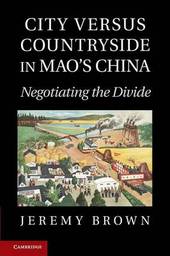
|
City Versus Countryside in Mao's China: Negotiating the Divide
Paperback / softback
Main Details
| Title |
City Versus Countryside in Mao's China: Negotiating the Divide
|
| Authors and Contributors |
By (author) Jeremy Brown
|
| Physical Properties |
| Format:Paperback / softback | | Pages:270 | | Dimensions(mm): Height 229,Width 152 |
|
| Category/Genre | Asian and Middle Eastern history |
|---|
| ISBN/Barcode |
9781107424548
|
| Classifications | Dewey:951.05 |
|---|
| Audience | | Professional & Vocational | |
|---|
| Illustrations |
5 Tables, unspecified; 2 Maps
|
|
Publishing Details |
| Publisher |
Cambridge University Press
|
| Imprint |
Cambridge University Press
|
| Publication Date |
6 March 2014 |
| Publication Country |
United Kingdom
|
Description
The gap between those living in the city and those in the countryside remains one of China's most intractable problems. As this powerful work of grassroots history argues, the origins of China's rural-urban divide can be traced back to the Mao Zedong era. While Mao pledged to remove the gap between the city worker and the peasant, his revolutionary policies misfired and ended up provoking still greater discrepancies between town and country, usually to the disadvantage of villagers. Through archival sources, personal diaries, untapped government dossiers and interviews with people from cities and villages in northern China, the book recounts their personal experiences, showing how they retaliated against the daily restrictions imposed on them while traversing between the city and the countryside. Vivid and harrowing accounts of forced and illicit migration, the staggering inequity of the Great Leap Famine and political exile during the Cultural Revolution reveal how Chinese people fought back against policies that pitted city dwellers against villagers.
Author Biography
Jeremy Brown is Assistant Professor of Modern Chinese History at Simon Fraser University. He is co-editor, with Paul G. Pickowicz, of Dilemmas of Victory: The Early Years of the People's Republic of China (2007) and has published articles in Late Imperial China and The Copenhagen Journal of Asian Studies.
Reviews'This is a well-written, often bitterly ironic, account of an extraordinary period in the development of modern China, but one which, in many ways, built the booming economy that we are confronted with in the second decade of the twenty-first century. As Brown concludes, the shadow of the Maoist era still casts itself across events even today, and this book does an excellent job of reminding us of this.' Kerry Brown, Asian Affairs 'Brown utilizes the whole range of the contemporary historian's tool kit. Focusing on Tianjin and the surrounding countryside, he rigorously uses newly opened local archives, memoirs, official sources and interviews. Brown has an eye for small, sometimes tragicomic details which make his work highly readable. He paints a realistic picture of rural areas as Maoist China's Siberia, a dumping-ground for urban undesirables and a colony for urban exploitation, but his analysis goes further than this.' Lauri Paltemaa, The China Journal '... in eight chapters [Brown] tells a great story of dynamic negotiations over the urban-rural divide that have constantly taken place between the city of Tianjin and its surrounding rural communities. Fundamental to the occurrence of these negotiations was, as Brown has documented in detail using archival sources, local publications, personal diaries and interviews, a variety of persistent resistances from the villages to Maoist policy programmes which were forced upon them by the city leadership in favour of the urban centre.' Yixin Chen, The China Quarterly '... City versus Countryside in Mao's China: Negotiating the Divide is a compelling, skillfully crafted study that presents a challenge to scholars who might hold a more positive view of the Mao era ... the book has much to offer students of modern Chinese history, especially those interested in the post-Great Leap Forward period, and has big implications for understanding the origins of anti-rural discrimination in China today.' Kristen E. Looney, China Review International
|